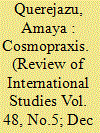| Srl | Item |
| 1 |
ID:
187534


|
|
|
|
|
| Summary/Abstract |
Bringing ontological questions back into IR has been key to opening discussions about plurality and difference in terms of the coexistence of related and plural worlds and realities, for example through notions such as relationality and pluriversality. The problem is that in trying to develop relational approaches as an alternative to the ‘Western/modern’ – atomistic – ontology, relationality, relations, and their meanings can become fixed, translating them into ‘things’. The article maintains that cosmopraxis – as a complex pluriversal, multidimensional set of experiences – not only illustrates how relations relate without fixing their meaning, but also provides us with relevant insights to contribute to think of a pluriversal and more plural IR.
|
|
|
|
|
|
|
|
|
|
|
|
|
|
|
|
| 2 |
ID:
192241


|
|
|
|
|
| Summary/Abstract |
Due to the challenge of defining Chineseness, various disciplines can contribute to the subject without a single authority having a monopoly over its scope. Post-Chineseness is an evolving movement that aims to reduce the embarrassment of China scholars at their failure to exchange the methodologies and scopes of their subjects, often rendering them strangers to one another. Recognition is particularly relevant to the study of post-Chineseness. Chineseness is mutually recognized and denied in a variety of ways among both Chinese communities and individuals and in both self-regarded and other-regarded identities. Divergent approaches have created complex behavioral implications and a massive agenda for social science research. An agenda for post-Chineseness can examine these crises in the contemporary social sciences and humanities and has the potential to offer sophistication, recombination, and reconstruction for Chineseness in different contexts. This case study of several Chinese Indonesian intellectuals who have described their identity and connection with China illustrates how an agenda of post-Chineseness can simultaneously explain and deconstruct.
|
|
|
|
|
|
|
|
|
|
|
|
|
|
|
|